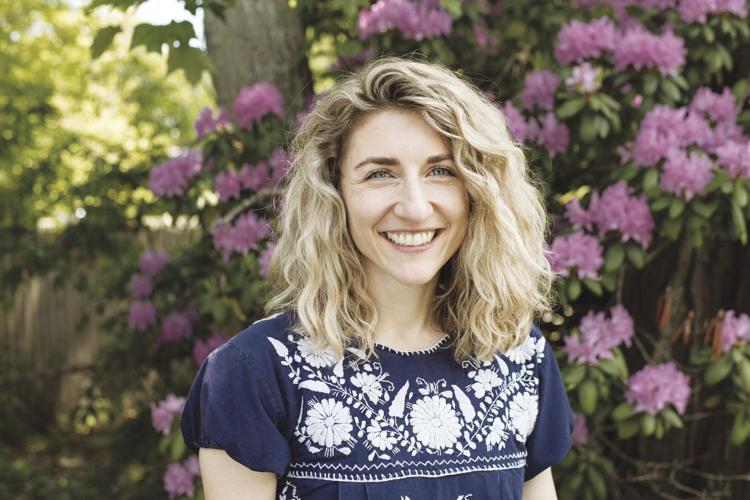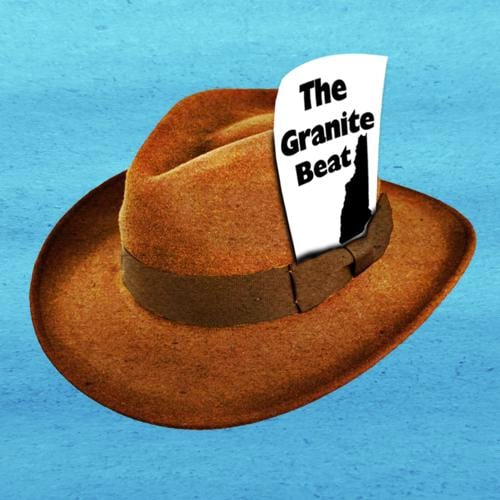On this episode of the Granite Beat, Lauren Chooljian, a reporter and producer for New Hampshire Public Radio's document team, is a New Hampshire native and graduate of St. Anselm College. Yet she had to stretch her wings a bit after St. A's and spent several years in Chicago with WBEZ. Back in New Hampshire and at NHPR, she caught wind of a bombshell of a story, which earlier this year was turned into a podcast called "The 13th Step." Adam Drapcho and Julie Hirshan Hart talk with her about her journalism journey and her most recent story.
This article has been edited lightly for length and clarity.
Julie Hirshan Hart: Lauren, could you start off by telling us when you first became interested in journalism and how, and then how you made it your career?
Lauren Chooljian: I went to St. Anselm College. And when I was there, I really had no idea what I wanted to do with my life. So I chose history as my major because I figured it would cover a lot of ground. And hopefully that'll be helpful; it would be good to know the history of the world, just like as a human in the world. And around the time when I was forced to decide that it was around the 2008 presidential primary. Saint A's really gets swept up in the tornado of primary madness around here. And we hosted some of the CNN debates for both and that primary was full of candidates on both sides. And so I got to be a runner at the CNN debates. And I just was like, this is so fun, and so wild, and just all the things that I, at that point, was interested in just being curious. I really like to write. I really liked how fast-paced everything felt. And through that experience, realized I wanted to be involved in news.
So I did a bunch of internships in college like WMUR. And I did a couple of radio internships, not public radio. I didn't actually learn about public radio till my senior year of college. And then that's when things started clicking for me. TV didn’t feel like a good fit. But I liked being in the news; radio felt like it gave me kind of more room to explore a little bit more time. I liked the intimacy of radio journalism. But I realized, though my history major was very important, that I didn't really have any journalism skills at that point. So I went to the Medill School of Journalism at Northwestern for graduate school. And that's where it really solidified for me that I definitely wanted to do radio.
And as you mentioned, I ended up at WBEZ and interned there before working there full time, and just absolutely fell in love with covering a city. It was so fast-paced, there were so many stories, so many things I had no idea about and was so curious to learn. And I stuck around there for a while, I covered City Hall for the majority of my time there during the administration of Mayor Rahm Emanuel. And it was just a blast. It's the best political reporting job ever, I think, covering Chicago politics. So we came back here and I ended up at NHPR. I did a little political reporting there for a while and covered the primary again, which was kind of a fun throwback after having been swept up in it in college. And then, as you've heard, left the political beat and got caught up in an even more wild story.
Adam Drapcho: For those who haven't heard your podcast yet, could you tell us how you got into the story about Granite Recovery Centers?
Chooljian: At the time it was 2020. A lot of what we were doing was covering the pandemic and different COVID outbreaks that happened at places that a lot of people in New Hampshire would want to know about. And in my case, we had gotten some tips about a potential COVID outbreak at Granite Recovery Centers' biggest facility, which is Green Mountain treatment center. So for those who don't know, Granite Recovery Centers is still today the largest provider of substance-use disorder treatment in New Hampshire. They run a network of facilities and at the time, it was run by the founder, Eric Spofford. He had started his career in treatment in 2008, when he opened up a sober home, which is still around today. And it really grew to this huge, huge network. And so when we got these tips about a COVID outbreak, we figured that was an extremely important thing for anyone to know, because they were able to take on so many clients. And so parents and family members, partners, they would want to know if there was an outbreak where their loved one was. So we published a story about the outbreak.
We had gotten some tips that something was awry there. We got those from nurses or people who worked on staff, just that there was COVID there. But once we had published that story, that is where we started to get a lot of tips. I think one was from a clinician who effectively was like, "when you think the COVID outbreak's bad, I have so much more to say." And this person was a clinician, she used to work at Green Mountain treatment center. And she alleged that Eric Spofford, the then-CEO and the founder of Granite Recovery Centers, he had engaged in multiple allegations of sexual misconduct, and that he was paying women to stay silent. And some of the women that they were alleging were former clients and employees.
So when you get something like that, obviously, you're really taken aback. But Adam and Julie, I had to check everything to the 100th degree. And so that's kind of where it all started. I got this big tip, there were some phone numbers in there for other people I should reach out to. We go into these things critically. You don't just take something like that, especially because it’s such a powerful allegation that could really ruin someone's reputation. We take that stuff really seriously and we want to be really careful. And that really set me on a long journey of eventually talking to around 50 people that either were clients or parents of clients or former employees, current employees, all kinds of people connected to that facility.
What we ended up finding was multiple corroborated allegations of sexual misconduct involving Eric Spofford who, like I mentioned, was the founder and the CEO. We ended up publishing a new story first, because we really felt like once we were able to corroborate some of these allegations that the people of New Hampshire really needed to know what we had found. And I'd also heard about other potential allegations. And people were really afraid of Eric, he is a really wealthy, powerful individual. He's amassed, what seems to be from his social media posts, great wealth from running this business and eventually selling it. And so people were really intimidated by the lengths he might go to defend himself.
People would tell me [and] sources were telling me he was very litigious. And so people were really worried about coming forward. And the allegations we did end up publishing in that first story. People didn't want to use their names, but we're OK using their voices in some cases. Other people were all right coming forward and going fully on the record. But, by putting that new story out there, not only were we informing the public of what we had, but we hoped that this was kind of like a vote of confidence in us as reporters that we took this seriously, we corroborated it.
And so we thought that then eventually more people would come forward. And that is exactly what happened. But a lot of other things happened. And I should say, before we publish that initial story, Eric, through his lawyers, denied any allegations of misconduct and actually threatened to sue us if we went forward with the reporting. But as I just mentioned, we did go through with that news story.
Drapcho: The story also pulled you and even your family into its orbit. Was there a point where you considered whether you should back off the story? And if you'd had that moment, what made you decide to press on?
Chooljian: So for people who don't know, it'd been a month since just the news story, because we're talking, of course, about the podcast, but that would come later. So about a month after the news story was published, my parents' home, my news director’s home and a house I used to live in in Hanover were all vandalized pretty violently. Bricks or rocks thrown through windows and the C-word was spray painted in red. My parents garage doors were spray painted with the C-word, my boss's front door and the old house I used to live in, front doors as well. So that was awful. And then a month after that, I mentioned not any house that I actually lived in. So the thinking at the time was they were trying to find me. And a month after the original incident, they did find me. And a brick was thrown through this huge, big window in the front of my house. And then just the beginning was spray painted red under the broken window.
Then on top of that, Eric Spofford wound up suing me, two of my colleagues, the station, and three of my sources for defamation. So we faced some pretty significant and what I would later learn as pretty unique retaliation for this reporting. At this point, what I can say about the vandalism is that the FBI got involved with federal prosecutors who have now charged four men with the vandalism including Eric Labarge, who is an extremely close friend of Eric Spofford. And then the three other men were men who the feds allege were paid by solicitors and paid by Eric Labarge to do these acts.
So that process is still playing out legally, as is the defamation lawsuit that Eric filed against us. So your question was, given all of that, did I ever consider stopping this work? And the answer is actually no. Which some people might think is pretty weird. But no, this was years of work. And so many people came to me, whether in confidence or on the record or in background, and shared horrible experiences, even if they weren't sexual misconduct allegations or toxic workplace complaints. Fear of a powerful person who ran their workplace. People told me that people knew about this abuse for years, and no one knew what to do about it.
Then, of course, there are the women who actually did make allegations, and some of them had allegations. Then she called me, wanted to talk, went on the record, and then was too afraid and backed out. And for all of that bravery, I'm a stranger to those people. And yeah, I was terrified and it was awful, especially my parents' house. I have a daughter. I'm clear and honest about how miserable and traumatic it all has been. But I was also pretty clear that this was just an effort to stop me from the reporting. And that was just not gonna happen. All of those people took a big risk talking to a reporter, so I had to finish the job. I'm lucky that law enforcement in Massachusetts, and then the federal government, kind of rushed to it once my house got involved and started an investigation. That's not always the case for victims of crimes ... and three of my sources got sued. I have a station behind me. So I have access to resources in both of these cases that my three sources who are sued don't have. And so I was really conscious, in a lot of ways of despite how awful it was for me, how I was going to be able to get through it, and it just didn't feel like fair for me to just drop the thing out of fear when all of these other people had already done a hard thing and come forward. But there was no moment where I was like, "I'm out." But of course, there were many moments where this affected me, but no, I didn't consider stopping.
Hirshan Hart: Lauren, what advice would you have for someone who wanted to start their career in journalism?
Chooljian: I still think it's the most fun job ever. So that might sound very strange, given all I just described, but I mean, give me another job, except for maybe like hairstylist, where you just get to hear people's lives and learn about worlds that you may never walk into. Otherwise, I just think it's the best. But I also acknowledge that this moment in history is an exceedingly difficult one. Journalists are maligned by powerful individuals, we've been called the enemy, it's not as easy to just go out there with your microphone, as it kind of was. But I believe that that makes it all the more essential and important. And that journalism is an essential piece of a healthy and functional democracy. And so despite the hardship, it really is important work. And so, if you're thinking about being a journalist, you should acknowledge that it's tough out there. And obviously, we don't make that much money. And newspapers are getting slashed especially hard. And it's not a great time. But it's so important. And it can be so rewarding. And I think it's also such a great community of colleagues. When all this s--- happened at my house, people like reporters from all over, my past colleagues, people I don't even know, they were the first in my corner to be like, "this is not OK." And "We're so sorry this happened." We are all very there for each other. I think, like the Chicago journalism world, it really stood up for me in a way that was essential to getting through this. And so I think you should still be a journalist, I think you should acknowledge that it's really hard, but that it's the best job there is, and specifically, radio is the best. So I think you should do it. And just know that you can always ask anybody for help, because that's how we all get through the day.
Hirshan Hart: And Lauren, where can people go to see more of your work?
Chooljian: They can go to nhpr.org. If they go to their podcast app, whatever app they prefer, and type in "The 13th Step," it's like a pink and orange art that they'll see. That obviously is the bulk. But if you want to know my old stuff, you just Google my name and NHPR and all kinds of things will come up. "Stranglehold," the podcast we did about the primary, reporting I did about nursing homes during early COVID.
•••
If you or someone you know is a victim of sexual assault, there are resources available. You can call the National Sexual Assault Hotline at 1-800-656-4673. It's available 24 hours a day.
This article is part of The Granite Beat, a project by The Laconia Daily Sun and The Granite State News Collaborative, of which Laconia is a partner. Each episode Adam Drapcho and Julie Hirshan Hart will explore with local reporters how they got some of the most impactful stories in our state and why they matter. This project is being shared with partners in The Granite State News Collaborative.




















(0) comments
Welcome to the discussion.
Log In
Keep it Clean. Please avoid obscene, vulgar, lewd, racist or sexually-oriented language.
PLEASE TURN OFF YOUR CAPS LOCK.
Don't Threaten. Threats of harming another person will not be tolerated.
Be Truthful. Don't knowingly lie about anyone or anything.
Be Nice. No racism, sexism or any sort of -ism that is degrading to another person.
Be Proactive. Use the 'Report' link on each comment to let us know of abusive posts.
Share with Us. We'd love to hear eyewitness accounts, the history behind an article.